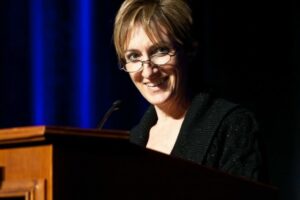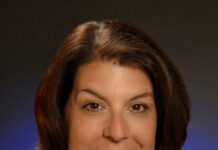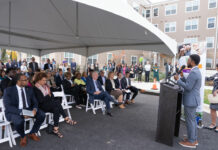
Rabbi Nina Beth Cardin has been at the forefront of change and innovation. She is one of the first female rabbis to be ordained in Conservative Judaism, has written several books and has been a champion of the environment in various roles.
While in New York, she founded the Jewish Women’s Resource Center, and later became the founding associate director of the National Center for Jewish Healing in 1994. While working as the director of Jewish life at the JCC of Greater Baltimore, a role she held for six years, Cardin founded and directed the Baltimore Jewish Environmental Network and served as chair of the Chesapeake Covenant Community. After leaving the JCC, Cardin founded and directed the Baltimore Orchard Project.
The Pikesville resident grew up in Baltimore and graduated from Connecticut College with a degree in anthropology and religion in 1975.
The number of ordained female rabbis, Cardin shared, were not many when she entered the Jewish Theological Seminary. Cardin was part of the first class of women in the Conservative movement to be ordained as rabbis in 1988, following Amy Eilberg, who was ordained with advanced standing in one year, in 1985.
“Several pioneer Jewish women were already active in the Jewish feminist movement, all who worked to open up several of the roles women could assume in Judaism,” Cardin said. “I rode on the coattails of their successes, working with other women to expand roles in ritual and professional positions, including the rabbinate.
“There was resistance to women becoming rabbis in both the Reform and Conservative movements,” Cardin said. She added that the Reform movement ordained Sally J. Priesand as their first female rabbi in 1972, followed by Sandy Eisenberg Sasso who was ordained in the Reconstructionist movement in 1974.
When asked how she felt to be part of a critically important change in the role of women in Judaism, Cardin said, “I feel like I am just an accident of history. I love the messaging of what the profession allows me to do — it so happens that my entry into seminary coincided with the need to fight for access. I don’t feel special in any way but do recognize that it was my lot in life to do something. I feel lucky that I got to live in such a historical time, and I was privileged to be part of it.”
Cardin said she never wanted to lead a congregation.
“I wanted to work as a community rabbi,” she said. “I felt that there was a need to attend to all those Jews who were not part of a congregation, as at any one time, there are more Jews not affiliated with synagogues than affiliated.”
She described her childhood as a loving one, surrounded by her parents, siblings and both sets of grandparents, all who would come together for Shabbat dinner every Friday night.
Cardin’s mother, Shoshana Shoubin Cardin, was born in Tel Aviv in 1926 and moved to Baltimore as a toddler. Cardin’s paternal grandfather arrived in the U.S. from Russia in the early 1900s, as part of the movement of Russian Jews who came to America to escape the pogroms violently targeting Jewish communities in Eastern Europe, while her paternal grandmother was born in the U.S.
It wasn’t until approximately four years ago that Cardin found out that her mother’s paternal grandparents — Cardin’s great-grandparents — died in the Holocaust, in the Rumbula massacre, in which it is estimated 25,000 Jews were murdered in the Rumbula forest outside Riga, Latvia, between Nov. 30 and Dec. 8 of 1941.
“My grandparents were of the generation that did not talk about their parents and the experiences they had,” Cardin said. “I learned this from a cousin, and it was such a blow, not to know all these years. I don’t know if I can describe it. I was named after my great-grandmother. This year for the first time I lit a candle on their yarhzeit.”
Cardin added that her grandfather — who loved Israel, read newspapers in Hebrew and owned a typewriter with Hebrew letters — carried a burden he never shared with the rest of the family.
Reflecting on Oct. 7 and the Israel-Hamas war, Cardin said, “What’s happening in Israel is heartbreaking. The hope that we had, that despite all of the problems of establishing a Jewish state in our homeland, we could live in peace with our neighbors, is broken. Hamas broke everything. I don’t know where that hope will come from right now. In classic wars, there’s war, but there’s an end, a way forward. I can’t see an armistice, a peace, a way forward. It’s a current and a future tragedy, and it’s beyond anything we imagined would happen.”
One program Cardin has going on right now is a group of women she pulled together who meet over Zoom to explore traditional Jewish women’s prayers, spanning centuries. The goal, Cardin said, was to bring people together in a setting that she loves — one of prayer, study and learning.
“We come together to study Jewish women’s traditions that are not well known,” she said. “For example, right now we are looking at a book written for Jewish women, printed in 1648, and it allows us to get out of the immediacy, to get lost in the texts and immerse ourselves in the lives of women from 400 years ago, and it reminds us that, despite our lack of ability to see a positive future, things can get better, that there can be peace.”
Notwithstanding the loneliness and betrayal of the moment, Cardin continues to be what she is known for — to quote Jewish Lights Publishing — “an inspiring and innovative leader in reclaiming and fashioning spiritual resources from Jewish tradition, and in making those resources relevant to our lives.”
“There is great wisdom in Jewish tradition,” Cardin said, “and there is a reason we light the lights of Chanukah at the darkest time of the year. Because it is then that we need to hold on to the lights of hope and renewal. Giving in to despair is not acceptable. It is a very, very dark time right now, but our tradition transcends the moment.”







